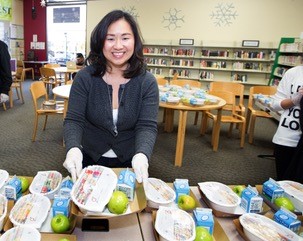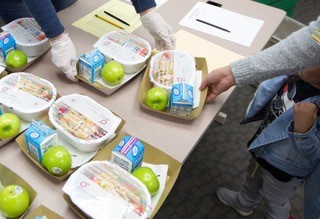Food for thought: Public libraries addressing child food insecurity and more
Public Health Nutrition Editorial Highlight: ‘More to Offer than Books: Stakeholder Perceptions of a Public Library-Based Meal Program’
Public libraries provide an open and welcoming place to go for books and reference materials. In recent years, public libraries across the United States increasingly recognize the complex social needs of library patrons and have responded by expanding the services they offer.
In 2018, 6.5 million children in the United States were food insecure at some point during the year. When school’s out for summer and winter breaks, food insecurity increases for many low-income children who lose access to free and reduced-price meals through the USDA’s National School Lunch Program. To bridge the summer meal gap, the federally funded Summer Food Service Program (SFSP) provides eligible community agencies such as schools, community centers, churches, libraries, and camps the ability to serve free meals to children.
For nearly a decade, libraries throughout the United States have served summer meals to low-income children through the Lunch at the Library program utilizing the SFSP funding mechanism. Participating libraries recognized that children not enrolled in structured summer learning programs come to public libraries for a safe, supervised place to stay, sometimes going without food for the entire day. Our previous study found that the parents of Lunch at the Library participants appreciated the economic benefit the program provided the community and the opportunity for their children to utilize the library’s many resources while also receiving a meal in an open, welcoming, and stigma-free setting (see Bruce et al. 2017, doi:10.1017/S1368980017000258).
Addressing social issues like food insecurity at the library is on the rise, and this change has been heavily influenced by the leadership and involvement of librarians and library staff who are acutely aware of the needs of the local community and their library patrons. The current study examines the views of library stakeholders on this changing role of the public library.
We interviewed 25 stakeholders (librarians and library staff) from 22 library jurisdictions in California located in areas that qualified for SFSP funding. We found that despite limited resources and staffing, stakeholders were highly motivated to develop solutions to community issues such as food insecurity. They believed that the open and welcoming nature of the library was ideal for reaching vulnerable populations potentially disconnected from traditional safety net systems. Additionally, stakeholders recognized Lunch at the Library as an example of how the library’s role in society is shifting from the provision of books and references to greater involvement in meeting patrons’ social needs—ushering in the reinvention of the library’s services and image. This reinvention, they believed, would demonstrate the value of the public library beyond books.
Despite the motivation to expand programs like Lunch at the Library, librarians and library staff face numerous administrative barriers and have limited funding to make this a reality. Revisions to restrictive federal funding requirements and increased fiscal support from the local and state levels are necessary to enable the library to further enrich and support the communities they serve.
Access the article: ‘More to offer than books: stakeholder perceptions of a public library-based meal programme’ Monica M De La Cruz, Kimmy Phan and Janine S Bruce.
Click here to view all Editorial Highlights from Public Health Nutrition








